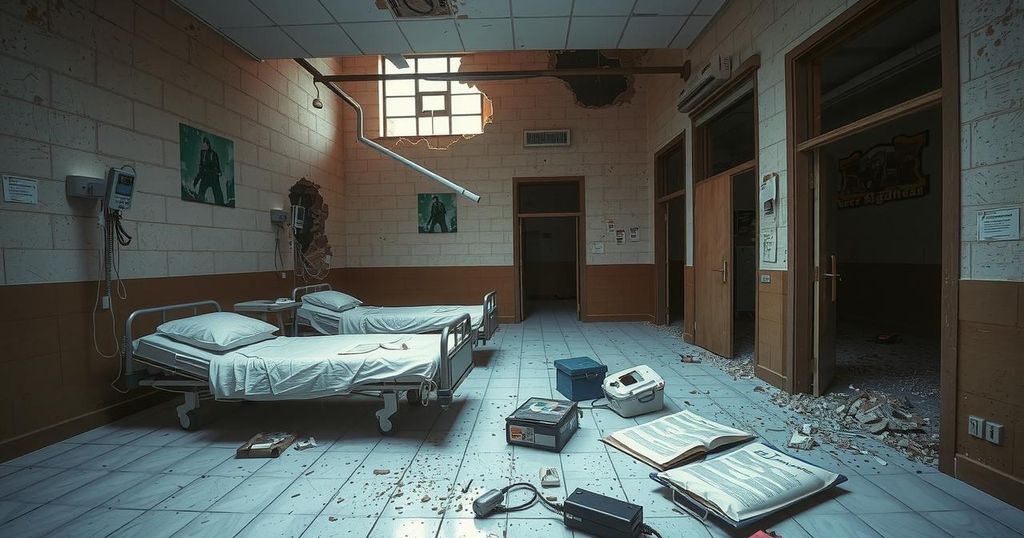Recent Attacks on Healthcare Create Crisis in South Sudan
Healthcare services in South Sudan are critically impacted by recent violent attacks, including shooting incidents on MSF boats and a serious assault on their hospital in Ulang. These incidents have forced the suspension of crucial outreach and hospital services, leaving the population vulnerable and struggling to access care amid ongoing conflict. The situation worsened at the Old Fangak hospital, which was bombed, exacerbating healthcare deficiencies in the region.
In South Sudan, recent attacks on healthcare facilities are causing significant distress among the population. In January, teams from Doctors Without Borders/Médecins Sans Frontières (MSF) were fired upon while navigating the Sobat River, leading to the suspension of crucial outreach services. Just months later, a hospital in Ulang was targeted and looted, halting vital medical services and severely impacting access to care in the region.
On January 15, MSF’s outreach team faced the sudden threat of gunfire, which incited panic as they returned to base. Riek, a community liaison for MSF, raced to the river after hearing shots, only to discover an empty boat adrift. “I was shocked, I thought my colleagues were dead,” said Riek, reflecting on the harrowing moments during the attack. Fortunately, most of the team reached safety, though one member was injured during the escape.
Even with MSF providing health care in Ulang since 2018, the recent violence has led to the difficult decision to cease outreach work. This is especially daunting as Ulang has long been affected by violence and instability. Since the attack, even basic medical aid has been compromised, further complicating healthcare access in a region that desperately needs it.
With outreach teams suspended, Dr. Philip noted a drop in hospital admissions. “Without MSF’s boats to transport patients, some now wait days or weeks for a way to reach us.” Travelers often face an arduous journey, with roads too damaged to use, particularly during the rainy season when floods block many routes.
One poignant story emerges from Ulang: a woman arrived too late to save her stillborn twins. “She was from Nasir, near where the attack happened,” shared Veronica, an MSF midwife. “She had to wait two days for a boat to reach Ulang. We could not hear any heartbeats from the twins. She was angry and sad—sad about losing her twins and angry that the attack happened.”
The health situation deteriorated further following assaults in April, when armed men stormed and looted MSF’s Ulang hospital, leading to its suspension. The surrounding community now lacks a single health facility. The situation follows a grim trend where attacks on medical services continually undermine healthcare in South Sudan, leaving communities vulnerable and without proper care.
On May 3, another incident crippled services in Old Fangak, where a deliberate bombing destroyed the MSF hospital’s pharmacy, incinerating crucial supplies. With the only hospital in the county incapacitated, the 110,000 locals served by it now face a dire lack of access to medical care.
David Charo Kahindi, MSF’s medical coordinator, vividly recalled the chaos following the bombing. “When I reached the pharmacy, it was on fire. People were screaming all around us,” he described. “I immediately recognized the enormity of the loss; the hospital, a lifeline for so many, was now gone.”
Charo further explained the extent of the destruction: “We had patients that we had to stabilize and evacuate, but we lacked supplies. I am completely heartbroken by what has happened. Hospitals should never be the targets; it should not come to this. Now, there is nothing left.”
The ongoing violence in South Sudan is taking a heavy toll on already vulnerable communities, with healthcare continuously compromised. As MSF grapples with the loss of facilities and the impact on the region, immediate support remains an urgent necessity.
In summary, the situation for healthcare in South Sudan is dire, with multiple attacks on medical facilities resulting in severe consequences for access to care. The recent incidents show an alarming trend of insecurity that jeopardizes the health and well-being of the population. Both community members and medical workers have expressed a deep sense of loss and urgency for action, stressing that hospitals should never be targets. The need for immediate assistance and security for healthcare workers is essential to restore services and protect vulnerable communities.
Original Source: www.doctorswithoutborders.org




Post Comment